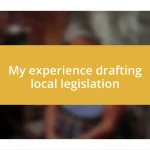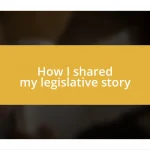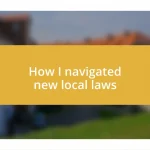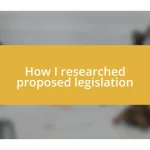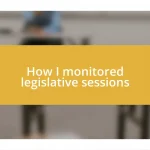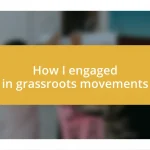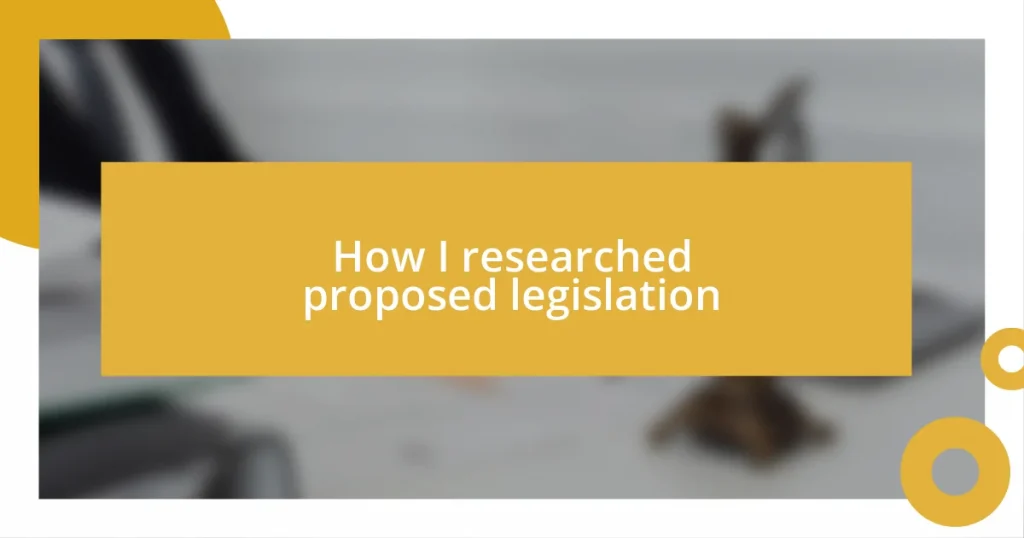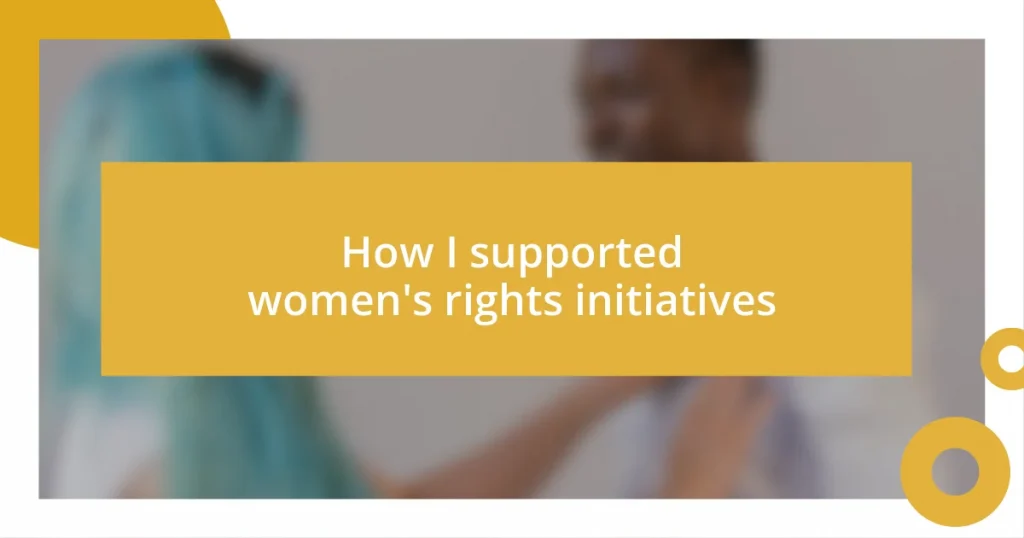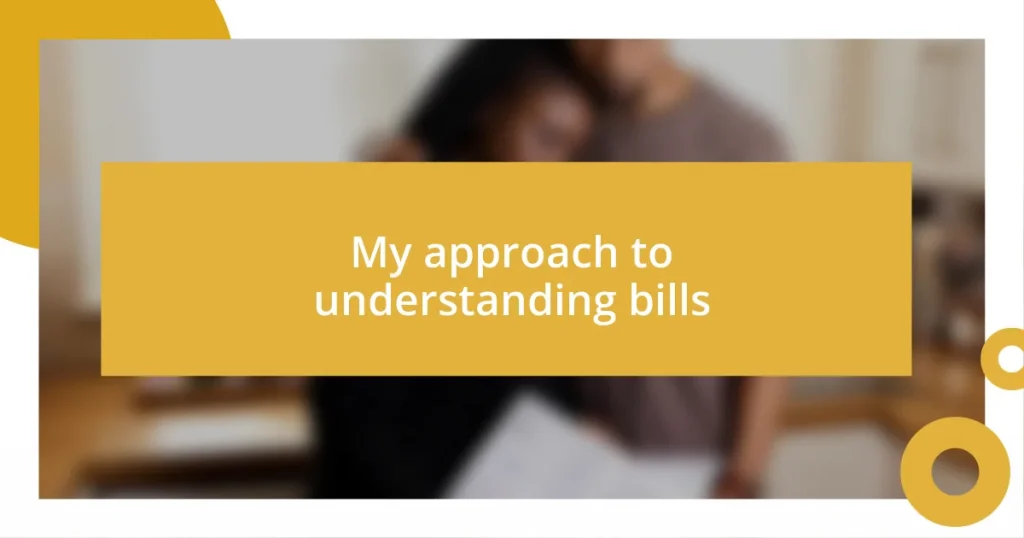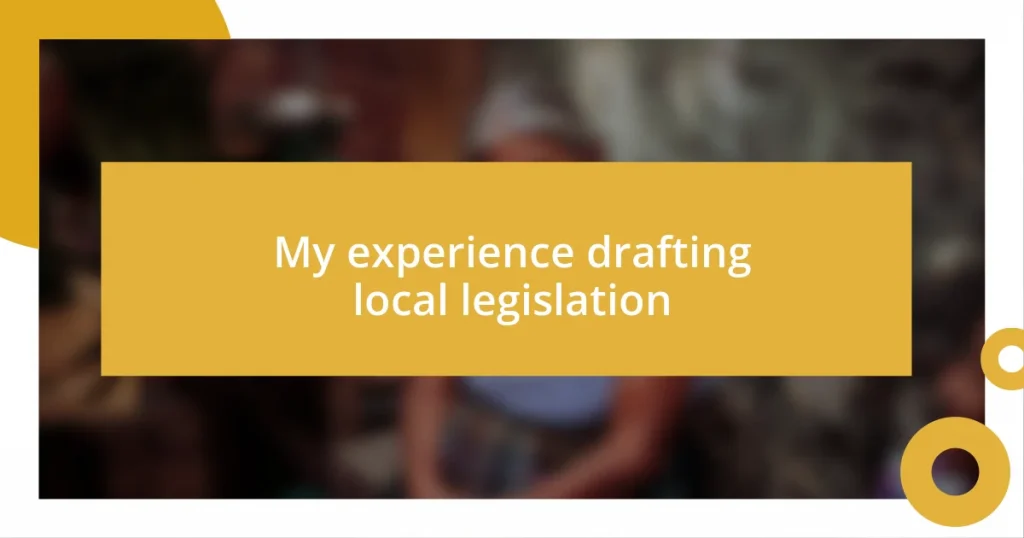Key takeaways:
- Understanding proposed legislation involves breaking down complex legal language and recognizing how personal perspectives shape interpretations.
- Utilizing reliable sources like government websites and legal databases is essential for comprehensive research on proposed bills.
- Engaging with stakeholders and experts, as well as evaluating legislative impact assessments, is crucial for uncovering deeper implications and ensuring informed advocacy.
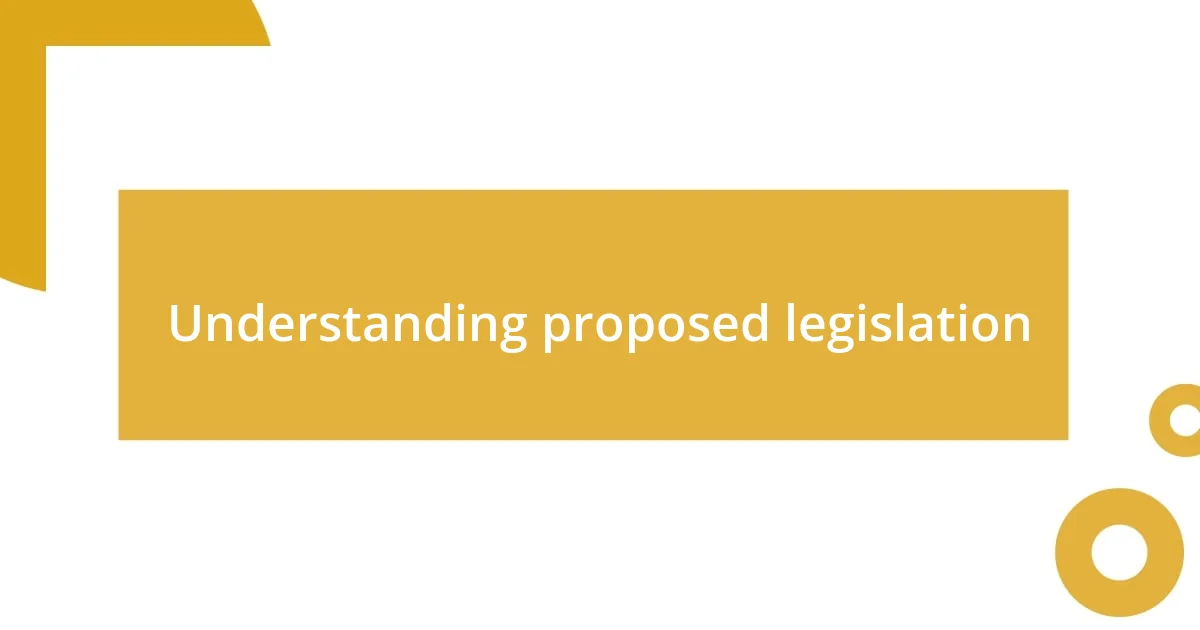
Understanding proposed legislation
Understanding proposed legislation can often feel like trying to decipher a complicated puzzle. I remember sitting in on a community meeting where a new bill was introduced, and I was struck by the diverse opinions swirling around the room. How could so many people interpret the same piece of legislation so differently? It made me realize that your perspective, background, and experiences significantly shape how you perceive proposed laws.
As I delved deeper into understanding the intricacies of various bills, I often found myself grappling with legal language that felt impenetrable. Honestly, it was frustrating at times. Have you ever read a law and thought, “What does this really mean?” I certainly have. Through workshops and discussions, I’ve learned that breaking down complex jargon into relatable terms is essential. This approach not only clarifies the content but also empowers more people to engage in the legislative process.
Another intriguing aspect is the role of public opinion in shaping legislation. During my research, I spoke with advocacy groups that passionately rally for or against bills. Their insights revealed how grassroots movements can sway legislators. It’s amazing to think that our voices can influence lawmaking. Have you ever felt like your opinion mattered? I believe it does, and understanding proposed legislation is the first step in making your voice heard.
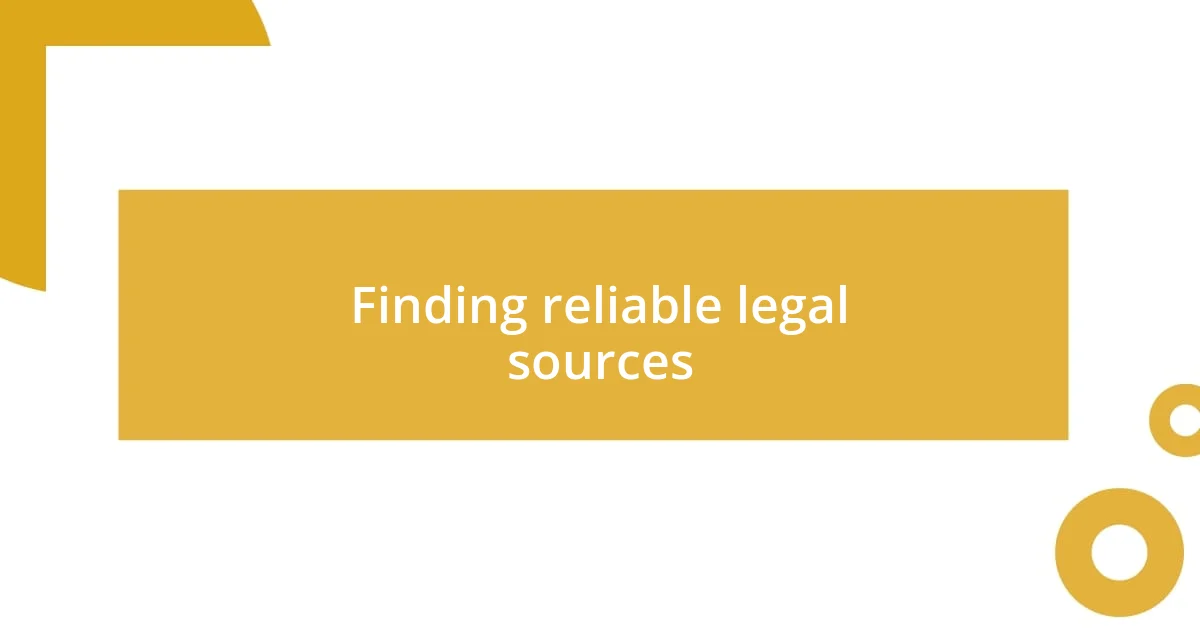
Finding reliable legal sources
Finding reliable legal sources is essential when researching proposed legislation. I’ve often relied on official government websites because they provide the most accurate and updated information. For instance, during my last legislative research project, I found that utilizing sites like Congress.gov helped me access comprehensive texts and summaries of bills, which clarified my understanding significantly.
Beyond official sites, I’ve discovered that legal databases, such as Westlaw or LexisNexis, can be incredibly useful. They offer a wealth of case law, statutes, and legal articles. I remember accessing a detailed analysis on a bill’s potential implications, which enriched my perspective beyond the basic text of the legislation. It can feel like unearthing hidden treasures of knowledge!
Lastly, I encourage checking community resources like local libraries or public interest groups. These organizations often host workshops or provide guides to navigate legal research. I recall attending a session at my local library where an experienced attorney shared invaluable tips on finding reliable legal sources. It was a game changer, reinforcing the idea that you don’t have to navigate this journey alone.
| Source Type | Description |
|---|---|
| Government Websites | Official sites that provide texts and summaries of legislation. |
| Legal Databases | Comprehensive resources for case law, statutes, and legal analysis. |
| Community Resources | Local libraries and advocacy groups that offer guidance and workshops. |
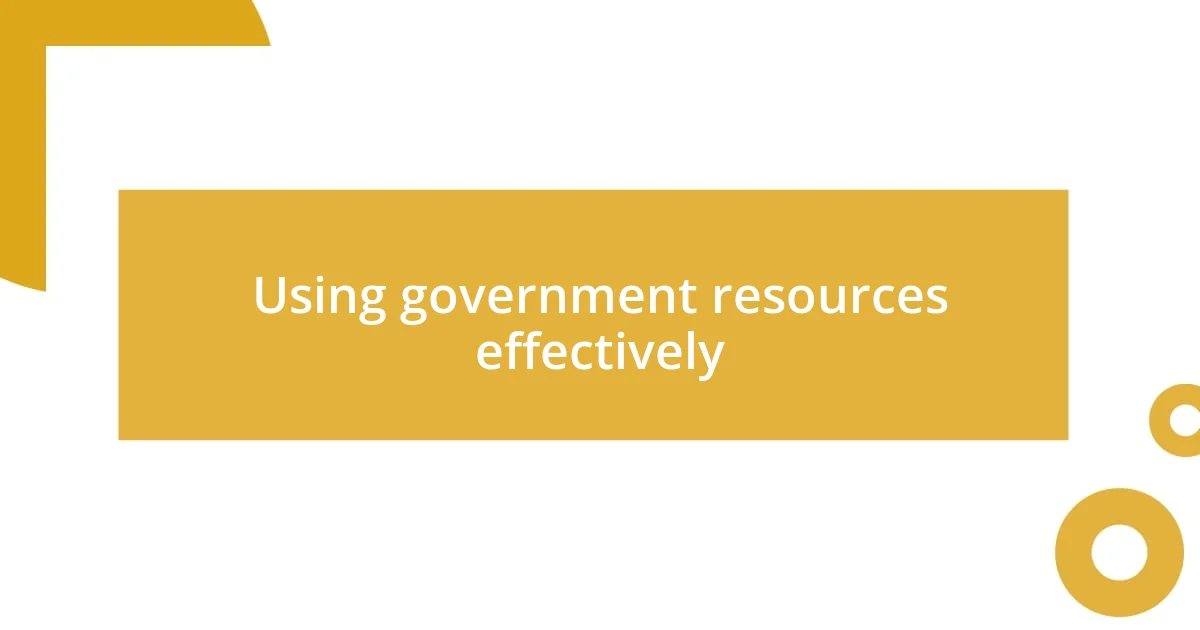
Using government resources effectively
Being efficient with government resources is crucial when it comes to researching proposed legislation. I remember the first time I navigated a government website—how overwhelmed I felt at first! However, once I got the hang of it, I discovered a wealth of information. Official sites not only provide bill texts but also offer insights into committee hearings and legislative histories. It’s like having a backstage pass to the law-making process.
Here are some strategies to use government resources effectively:
- Bookmark Key Sites: Government websites such as Congress.gov and state legislatures’ pages can be invaluable for tracking legislation.
- Utilize Search Functions: Many sites have search features that allow you to filter by keyword, sponsor, or status, which saves you time.
- Follow Up on Live Sessions: Watching committee sessions or public hearings can deepen your understanding of how proposed legislation is discussed and debated.
I’ve also found that engaging directly with governmental offices can be beneficial. Joining mailing lists or attending town hall meetings not only keeps you informed but also connects you with officials who are eager to explain their work. Knowing who to reach out to can be the difference between blurry information and crystal clarity.
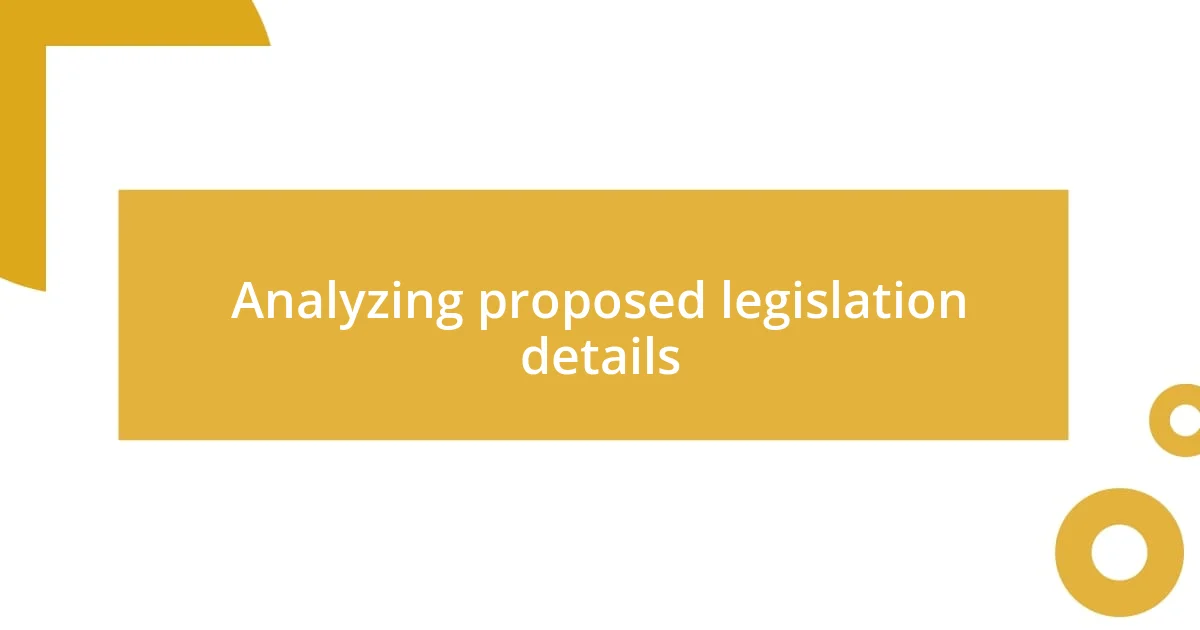
Analyzing proposed legislation details
When analyzing proposed legislation, the details often reveal deeper implications that may not be apparent at first glance. I remember pouring over a bill’s language that, on the surface, seemed straightforward. Yet, as I broke down its sections line by line, the nuances started to emerge, highlighting potential impacts on different communities. Have you ever had that moment when a simple phrase shifts your entire understanding of a bill? I can certainly relate to the surprise of discovering how sweeping changes can be hidden in legal jargon.
It’s also important to examine the context surrounding the legislation. I often find myself researching the motivations behind a proposal by looking at press releases or statements from sponsors. For example, during my last analysis, I encountered a bill intended to streamline local government processes. Understanding the political climate and public sentiment at the time really helped me grasp why this bill was particularly pressing. By questioning the “why” behind the legislation, I gained invaluable insights that added depth to my understanding.
Lastly, mapping out the potential consequences is crucial. While reviewing a proposed bill on educational reform, I discussed its potential fallout with a few educators. Their perspectives highlighted considerations that the text alone didn’t cover. Engaging with stakeholders and seeking their experiences can illuminate the real-world impact of legislation, transforming what might seem like a dry legal document into a living discussion that affects many lives. How do you gather insights from those directly impacted by such laws? For me, those conversations made the research feel more meaningful and connected to actual people.
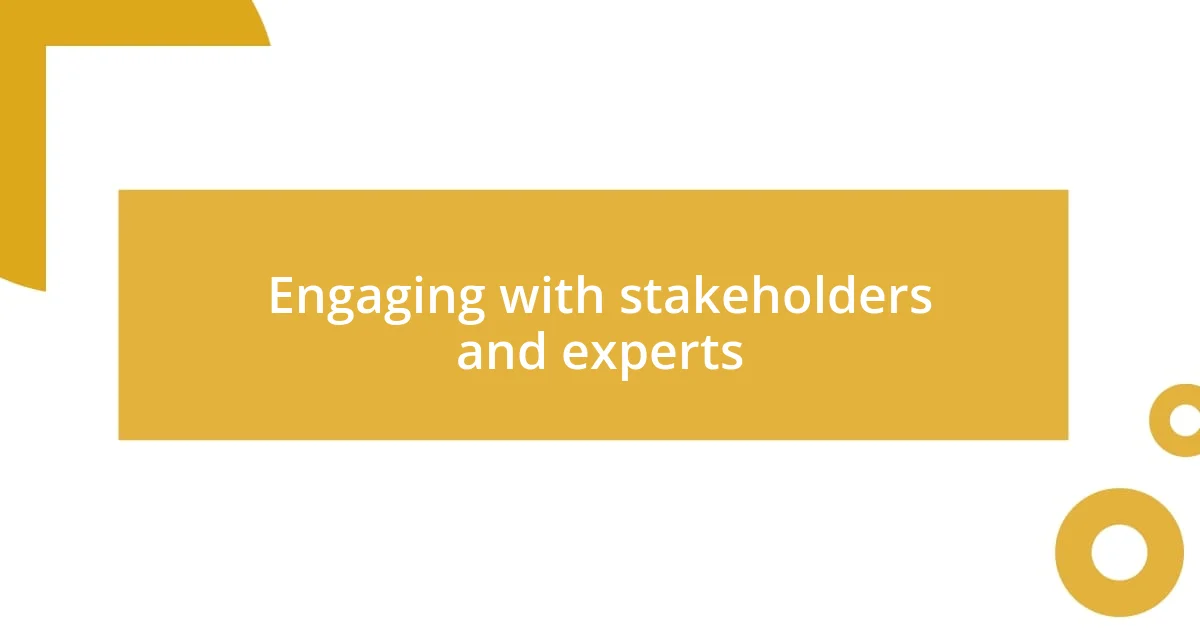
Engaging with stakeholders and experts
Engaging with stakeholders and experts is a dynamic aspect of researching proposed legislation. I recall a time when I reached out to a local nonprofit focused on education. Their genuine enthusiasm for the proposed legislation transformed my understanding. Listening to their firsthand accounts of how educational policies affect students made the legislative details resonate on a personal level. Have you ever felt a connection to an issue through the stories of those directly impacted? For me, those conversations ignited a sense of urgency and purpose in my research.
It’s crucial to not just gather information but to foster relationships. I often make a point to attend regional forums or webinars where legislators and community members address issues directly. One memorable event I attended featured a passionate discussion between state officials and parents regarding healthcare reform. Hearing their perspectives really drove home the idea that legislation isn’t just a collection of words—it’s about real lives and genuine struggles. How can we create better informed policies if we remain insulated from the voices that matter most?
Moreover, I find that reaching out to experts can unveil layers of complexity within a legislative proposal. During one of my research phases, I connected with a policy analyst who specialized in environmental legislation. Their insights on the long-term implications of certain provisions opened my eyes to consequences I hadn’t fully considered. It made me wonder—how often do we overlook expert opinions in favor of quick conclusions? Emphasizing these valuable interactions not only enriches our understanding but also empowers us to advocate for more thoughtful and inclusive legislation.
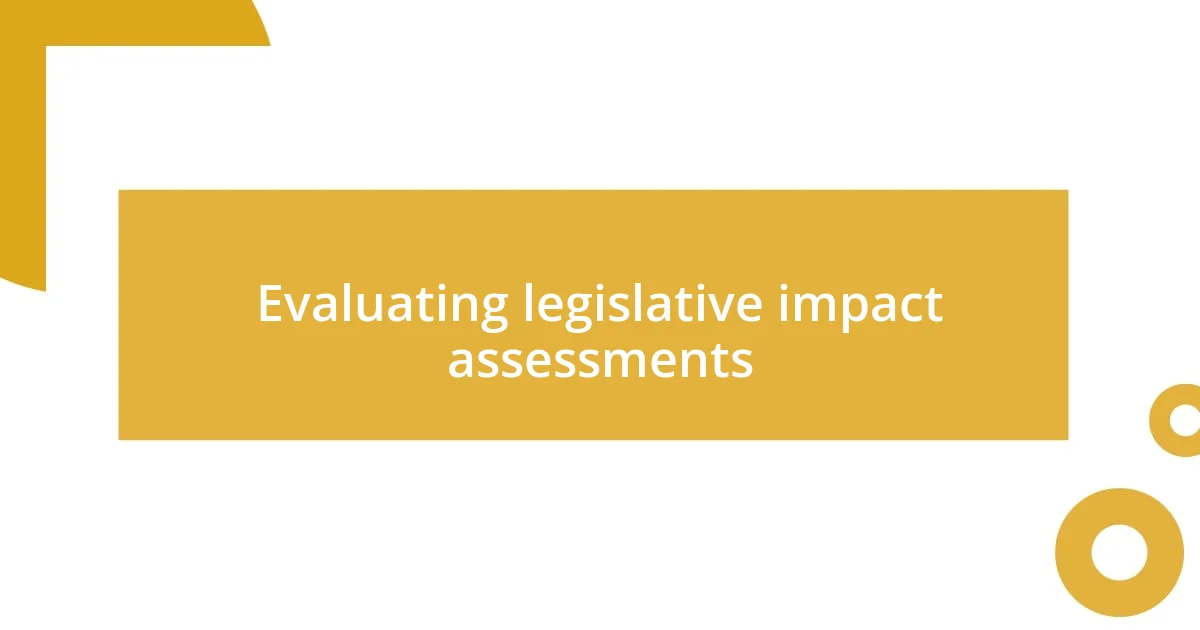
Evaluating legislative impact assessments
Evaluating legislative impact assessments can be quite revealing, as they often serve as the backbone of understanding a bill’s potential effects. I vividly remember diving into a comprehensive impact assessment for a healthcare proposal that initially seemed routine. Yet, as I navigated through the lists of projected costs and benefits, I uncovered serious implications for rural communities that hadn’t crossed my mind. Have you ever encountered data that significantly altered your perspective on an issue? That experience taught me just how crucial it is to question the assumptions often embedded in these assessments.
The clarity these assessments provide can sometimes be masked by overly technical language. I recall sitting in a meeting where a legislative analysis was presented, and crucial points were glossed over. It was a challenge to peel back those layers and ask for clearer explanations. I’ve found that engaging with facilitators in such settings often leads to “aha” moments where unexpected impacts come to light. How can we truly understand the landscape of a proposed law if we’re lost in jargon? Simplifying the findings not only aids transparency but also encourages broader participation in the legislative process.
Moreover, I’ve learned the value of critiquing the methodologies used in these assessments. For instance, during one evaluation of a proposed environmental regulation, the assumptions about industry compliance were overly optimistic. Engaging conversation with those in the field revealed skepticism that wasn’t reflected in the analysis. It made me think—what happens when we take these assessments at face value? Recognizing that impact assessments can contain biases or omissions is essential for a well-rounded understanding. After all, legislation is not just about numbers; it’s about people and the real lives affected by policy decisions.
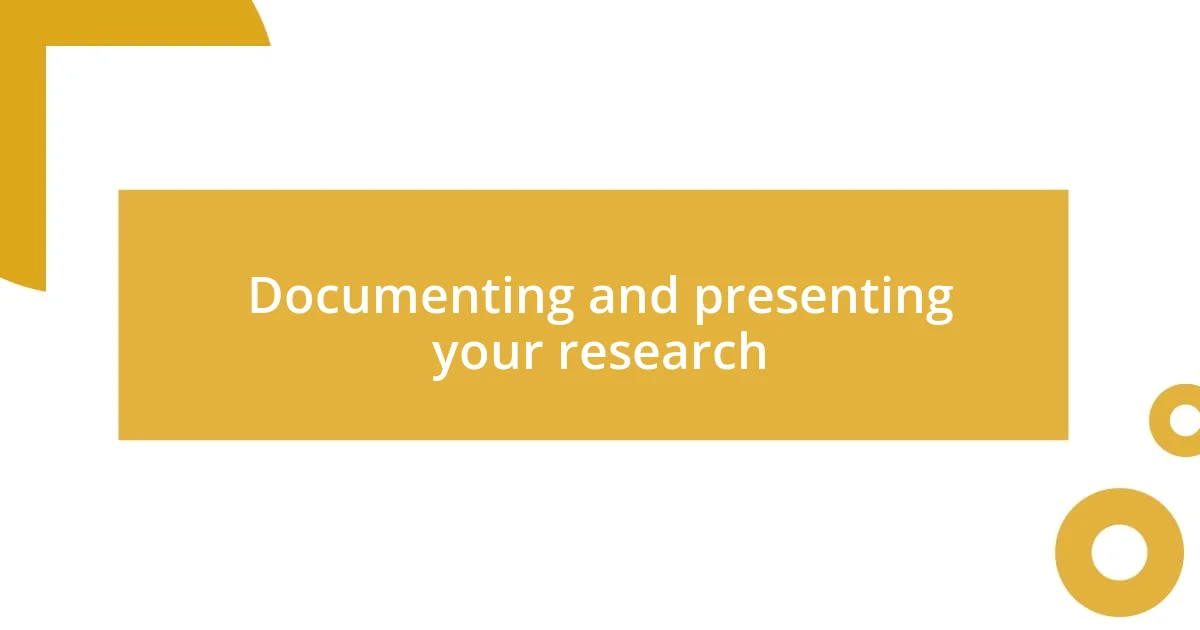
Documenting and presenting your research
Documenting your research effectively is just as critical as the research itself. I remember once sitting down with a stack of notes after a long week of interviews, eager to sort through the treasure trove of insights I’d gathered. I opted for a visual approach, creating charts and infographics that mapped out relationships between data points. Have you ever felt like visualizing information helped clarify your understanding? It can transform complex findings into digestible pieces, making it easier to communicate your findings.
Presenting research requires not just clarity but also storytelling. I recall preparing for a presentation on proposed education funding, where I crafted narratives around individual students whose lives could change with new policies. Those stories resonated deeply with my audience, making them more invested in the numbers I presented. How do we breathe life into unaffecting statistics? By anchoring our findings in real-life experiences, we can engage our audience on a more emotional level, motivating them to advocate for change.
Moreover, I’ve found that documenting my sources meticulously builds credibility. I once lost a potential collaboration opportunity due to a forgotten citation, which was a painful lesson in diligence. I now keep a running list of every source, complete with notes on how I integrated their insights into my work. Why is documentation so important? It paves the way for transparency and validation, ensuring others can trust and build upon our research. After all, when we share our findings, we want to foster a community of informed advocates, not just a collection of isolated ideas.


